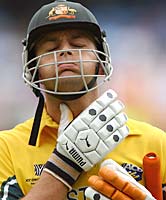He might have bit the apple but Adam Gilchrist wants to return to innocence.
 The buccaneer Australian wicketkeeper-batsman, who did the most un-Aussie thing of walking before the umpire raised his finger during the World Cup in South Africa, thinks the players have to take some responsibility to reduce the umpires' pressure.
The buccaneer Australian wicketkeeper-batsman, who did the most un-Aussie thing of walking before the umpire raised his finger during the World Cup in South Africa, thinks the players have to take some responsibility to reduce the umpires' pressure.
"Our country has been great promoters of staying there and make the umpires make the decision ... but I think maybe the players should take up some responsibility," Gilchrist said.
The Australian, who is part of the team to play the triangular limited overs cricket series with India and New Zealand, said it was a series of incidents that prompted him to walk, in the semi-final match against Sri Lanka early this year.
"Certainly I did not go out that day with a conscious decision to walk. There were a number of events over the last one year that was starting to frustrate me," Gilchrist said.
"Players standing their crease ... I am not pointing to any one player, certainly our own players have been involved in several incidents.
"But it is the third umpire decisions, which could not say definitely whether there was a nick or catches carried.
"Those thoughts changed my mind. I now believe you can still compete and succeed at the highest level by playing with integrity."
Naturally, the incident during Australia's visit to India in 2001 -- when Michael Slater picked up an argument with Rahul Dravid and the umpires when an appeal for caught behind against the Indian was turned down—cropped up.
"I don't want to pick any one incident," Gilchrist said. "Dravid in that scenario stood his ground rightly because the rules said he can.
"Michael (Slater) and other guys were disappointed with the decision, were gilted up in the heat of the battle and over reacted a little bit.
"The spirit of the game is to accept the umpire's decision and get on with the game, which in the end we did.
"But, the players have to be more accountable and responsible and make the decision making for the umpires that much easier."
Gilchrist, however, said the decision—to walk or not should be an individual one.
"I don't want to get into a campaign and go tell every player to walk," he said. "It is an individual thing.
"It differs from player to player, even within our team. It is a decision each player should be comfortable with because there are lot of things riding on it—the player's stage of the career, his mindset and like that."
But will he himself walk, if it ever came to that, again?
"I don't think I will nick one again."
On sledging in cricket, Gilchrist said there was place for an "acceptable level of verbal trade-off" in the game, and there was a need to "educate the followers of the game about that."
"Definitely a tag has stuck with the Australian team and there has been a conscious, combined effort by the Cricket Australia and the players' group to remove that," he said.
"But it has always been a two-way street, we are not the only ones to do that (sledging).
"We think cricket, or any sport, has always been played with a spirit that is acceptable. What is needed is to make sure the players don't go beyond that limit."
Moving on to cricket matters, the swashbuckling Aussie batsman said he played attacking cricket because it was his basic role.
"As an opening batsman (in one-day cricket), I have a role to play, to be positive and aggressive.
"It is when I get into trouble that I play premeditated shots, as it happened in Mumbai (in the first Test) in 2001 when we were five down quickly.
"But when I have a clear mind, that is when I play my best cricket."
Gilchrist denied that he had redefined the role of wicketkeepers and gave that credit to his predecessors Rodney Marsh and Ian Healy.
"I think it was Rod Marsh who was the pioneer ... then Ian Healy took it to another level.
"As for me, Healy was the guy I have always looked upto, and even copied. I also think one-day cricket really made the wicketkeeper all rounder."
So, how does he do both the jobs so well?
"It is my keeping that allows me to be the batsman I am. I see myself as a specialist wicketkeeper first, and when I do my job (behind the stumps) well, I feel free to bat uninhibitedly."